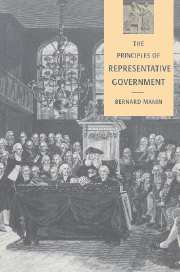Book contents
4 - A democratic aristocracy
Published online by Cambridge University Press: 08 March 2010
Summary
During the nineteenth and early twentieth centuries, one trend dominated the development of representative institutions: the extension of the right to vote, which eventually culminated in universal suffrage. Another transformation also took place: wealth requirements for representatives disappeared. These two changes gave rise to the belief that representation was progressing toward popular government. Free election of representatives by all adult citizens came indeed to be almost completely identified with democracy. In this context, the hypothesis that elections might include an inegalitarian and aristocratic dimension did not even seem worthy of theoretical inquiry. More broadly speaking, the movement toward universal suffrage, without legal constraints on the social origins of candidates, constituted such a manifest advance of political equality that the possible persistence of inegalitarian or aristocratic effects appeared simply irrelevant. It seems that the aristocratic nature of elections has prompted no conceptual investigation or political debate since the beginning of the nineteenth century.
The American debate of 1787 was thus the last occasion on which consideration was given to the possible presence of aristocratic features in systems based on free elections. That debate in fact marked both a turning-point and a certain advance in the understandine of what political theorists had long been saying. In the first place, whereas philosophers from Aristotle to Rousseau had argued that election was aristocratic by comparison with lot, neither the Anti-Federalists nor the Federalists had selection by lot in mind. Both camps believed that elections select individuals who are in some way superior to those who elect them. It was in this phenomenon that they saw the aristocratic dimension of the elective method.
- Type
- Chapter
- Information
- The Principles of Representative Government , pp. 132 - 160Publisher: Cambridge University PressPrint publication year: 1997



